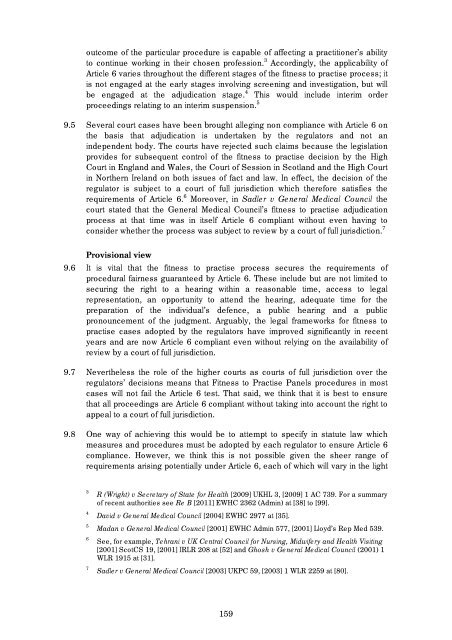Regulation of Health and Social Care Professionals Consultation
Regulation of Health and Social Care Professionals Consultation
Regulation of Health and Social Care Professionals Consultation
You also want an ePaper? Increase the reach of your titles
YUMPU automatically turns print PDFs into web optimized ePapers that Google loves.
outcome <strong>of</strong> the particular procedure is capable <strong>of</strong> affecting a practitioner’s ability<br />
to continue working in their chosen pr<strong>of</strong>ession. 3 Accordingly, the applicability <strong>of</strong><br />
Article 6 varies throughout the different stages <strong>of</strong> the fitness to practise process; it<br />
is not engaged at the early stages involving screening <strong>and</strong> investigation, but will<br />
be engaged at the adjudication stage. 4 This would include interim order<br />
proceedings relating to an interim suspension. 5<br />
9.5 Several court cases have been brought alleging non compliance with Article 6 on<br />
the basis that adjudication is undertaken by the regulators <strong>and</strong> not an<br />
independent body. The courts have rejected such claims because the legislation<br />
provides for subsequent control <strong>of</strong> the fitness to practise decision by the High<br />
Court in Engl<strong>and</strong> <strong>and</strong> Wales, the Court <strong>of</strong> Session in Scotl<strong>and</strong> <strong>and</strong> the High Court<br />
in Northern Irel<strong>and</strong> on both issues <strong>of</strong> fact <strong>and</strong> law. In effect, the decision <strong>of</strong> the<br />
regulator is subject to a court <strong>of</strong> full jurisdiction which therefore satisfies the<br />
requirements <strong>of</strong> Article 6. 6 Moreover, in Sadler v General Medical Council the<br />
court stated that the General Medical Council’s fitness to practise adjudication<br />
process at that time was in itself Article 6 compliant without even having to<br />
consider whether the process was subject to review by a court <strong>of</strong> full jurisdiction. 7<br />
Provisional view<br />
9.6 It is vital that the fitness to practise process secures the requirements <strong>of</strong><br />
procedural fairness guaranteed by Article 6. These include but are not limited to<br />
securing the right to a hearing within a reasonable time, access to legal<br />
representation, an opportunity to attend the hearing, adequate time for the<br />
preparation <strong>of</strong> the individual’s defence, a public hearing <strong>and</strong> a public<br />
pronouncement <strong>of</strong> the judgment. Arguably, the legal frameworks for fitness to<br />
practise cases adopted by the regulators have improved significantly in recent<br />
years <strong>and</strong> are now Article 6 compliant even without relying on the availability <strong>of</strong><br />
review by a court <strong>of</strong> full jurisdiction.<br />
9.7 Nevertheless the role <strong>of</strong> the higher courts as courts <strong>of</strong> full jurisdiction over the<br />
regulators’ decisions means that Fitness to Practise Panels procedures in most<br />
cases will not fail the Article 6 test. That said, we think that it is best to ensure<br />
that all proceedings are Article 6 compliant without taking into account the right to<br />
appeal to a court <strong>of</strong> full jurisdiction.<br />
9.8 One way <strong>of</strong> achieving this would be to attempt to specify in statute law which<br />
measures <strong>and</strong> procedures must be adopted by each regulator to ensure Article 6<br />
compliance. However, we think this is not possible given the sheer range <strong>of</strong><br />
requirements arising potentially under Article 6, each <strong>of</strong> which will vary in the light<br />
3 R (Wright) v Secretary <strong>of</strong> State for <strong>Health</strong> [2009] UKHL 3, [2009] 1 AC 739. For a summary<br />
<strong>of</strong> recent authorities see Re B [2011] EWHC 2362 (Admin) at [38] to [99].<br />
4 David v General Medical Council [2004] EWHC 2977 at [35].<br />
5 Madan v General Medical Council [2001] EWHC Admin 577, [2001] Lloyd’s Rep Med 539.<br />
6 See, for example, Tehrani v UK Central Council for Nursing, Midwifery <strong>and</strong> <strong>Health</strong> Visiting<br />
[2001] ScotCS 19, [2001] IRLR 208 at [52] <strong>and</strong> Ghosh v General Medical Council (2001) 1<br />
WLR 1915 at [31].<br />
7 Sadler v General Medical Council [2003] UKPC 59, [2003] 1 WLR 2259 at [80].<br />
159
















